

Dr. Karen’s Foolproof Grant Template. NOTE: An expanded and updated version of this post can now be found in Chapter 51 of my new book, The Professor Is In: The Essential Guide to Turning Your Ph.D.

Into a Job. I am keeping a shortened version here, but for the complete discussion including the visual model of the Foolproof Grant Template, please do purchase the book, which compiles all my major job market posts along with 50% entirely new material. Unveiled here: Karen’s Famous and Foolproof Research Proposal Template. This Research Proposal Template has won hundreds upon hundreds of thousands of dollars in grant money for multiple graduate students and scholars in the social sciences and humanities over the past 15 years. You may share, but please credit Dr. Let’s walk through this step by step. The first step is to identify what large general topic of wide interest that your specific project relates to. If you work on arcane topics or in a small field (ie, medieval French literature), don’t despair. It reads like this: Research funding: writing a successful grant proposal – live chat.
To many academics the following account may sound familiar: "I personally spend about a third of my time writing for grants, fellowships and PhD studentships – which is time I cannot spend helping to foster ongoing experiments.
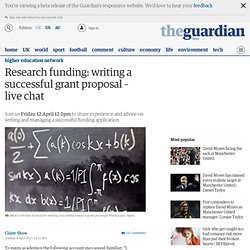
Research funding: 10 tips for writing a successful application. Read the eligibility rules It's important to understand what can be funded and what can't on a particular call, says Ken Emond, head of research awards at the British Academy for the Humanities and Social Sciences.
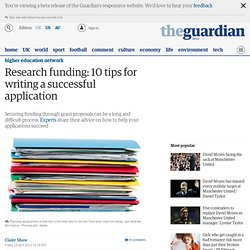
Take a hard look at the priorities of the funding body you are applying to. It is the knack of linking what you want to do, with what they want to know, adds Mel Bartley, a medical sociologist. Leave plenty of time to prepare Most people would be better off submitting fewer grants but putting far more effort into the ones that they do, says Rebecca Steliaros, strategist, facilitator and REF (research excellence framework) impact advisor to eight UK institutions. No unexplained jargon The review is conducted by your peers, so advice we give on grant writing is about getting your message over in the clearest way in the available space, says Adam Staines, head of policy at Research Councils UK.
Picking up the pieces. 29 January 2013 by Tseen Khoo Gingerbreak man (Photo by Tseen Khoo) So, you’ve lost out on the major grant rounds for last year.

It only took about eight months to find out, right? Often, you’ve waited with all of your career possibilities riding on the outcome. And you got nothing. As the congratulatory emails, posts, and drinkies ramped up, it was easy to get a little bitter and twisted about the whole thing. I can say that I truly understand how you feel. I’m writing this post for you to read after you’ve had a few weeks to get over the angst and disappointment of not scoring a grant, hopefully had a break, and been able to take a step back.
If you’re going to persist in the academic caper, it’s very useful to find a constructively destructive way to channel that post-grant-announcement frustration and anger, that feeling that you’ve been cheated. There are no guarantees about winning the grants race, but you can do your best to ensure you make it through the heats. Gender inequality in awarded research grants. Under-representation of women at higher levels of faculty in the biomedical sciences has long been noted.1 However, whereas differences in representation in academic sciences are clear, less is known about disparities in important indicators of research success that might partly account for such differences, such as success in obtaining funding.2—4 For instance, the equity of amounts awarded to male and female awardees has not been assessed.
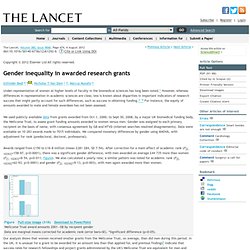
We used publicly available data from grants awarded from Oct 1, 2000, to Sept 30, 2008, by a major UK biomedical funding body, the Wellcome Trust, to assess grant funding amounts awarded to women versus men. Gender was assigned to each primary recipient on the basis of name, with consensus agreement by GB and NTVD (internet searches resolved disagreements). Data were available on 10 283 awards made to 7015 individuals. HOME - Research Council Priority Generator. Cash for Questions: social science research funding, policy, and development.
Preliminary evidence appears to show that this approach to responding to referees is - on balance - probably sub-optimal.
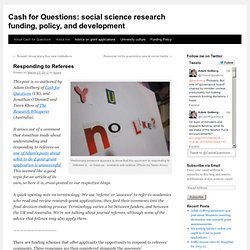
(Photo by Tseen Khoo) This post is co-authored by Adam Golberg of Cash for Questions (UK), and Jonathan O’Donnell and Tseen Khoo of The Research Whisperer (Australia). %7B7a9cb4f4-815f-de11-bd80-001cc477ec70%7D. Value quality of research, not grant proposals, Sir Paul Nurse urges. Research funders should avoid “micromanaging” research and requiring applicants to set out the impact of their proposals, according to the president of the Royal Society.
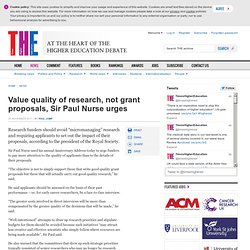
Sir Paul Nurse used his annual Anniversary Address today to urge funders to pay more attention to the quality of applicants than to the details of their proposals. “The objective is not to simply support those that write good quality grant proposals but those that will actually carry out good quality research,” he said. He said applicants should be assessed on the basis of their past performance – or, for early career researchers, by a face-to-face interview. “The greater costs involved in direct interviews will be more than compensated by the greater quality of the decisions that will be made,” he said. “Better judgements are more likely to be made by the scientists actually carrying out specific areas of research, who are much closer to the research problem being pursued,” he said. paul.jump@tsleducation.com. How to succeed with grant applications.